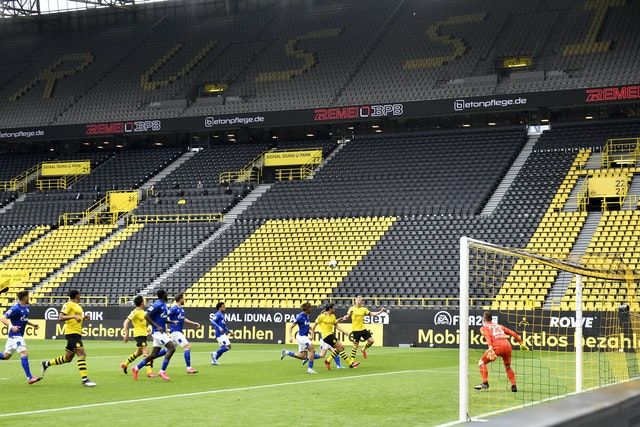Home Advantage During the Pandemic
Empty stands in Borussia Dortmund’s Signal Iduna Park as the German Bundesliga opened league play on May 16.
June 4, 2020
Home-court advantage in the NBA playoffs. Home-field advantage in the MLB playoffs. In major tournaments for professional sports, it’s widely believed that playing games at home stadiums yields an advantage. In European football (soccer), this belief is manifested in the UEFA Champions League’s use of away goals. In a competition where rounds are played in two games — one at home and the other away — the Champions League uses these away goals as a tiebreaker, where the team with more away goals advances. But what happens to home advantage during the pandemic?
First of all, what makes home advantage an advantage? When players travel to away games, they often ride a team bus or plane, stay a few days in a hotel, and play in a foreign environment with fans who are less likely to cheer for you. In contrast, a home game is often minutes away by car from your own home and is hosted in a familiar stadium, with loyal fans surrounding you to cheer. Additionally, Bleacher Report, a sports newspaper, also proposes a placebo effect: that home advantage exists because players believe it does.
However, with the social distancing rules accompanying the pandemic, sports leagues have been mostly shut down over concerns for players’ health. Recently though, major European soccer leagues have begun resuming league play — albeit without fans in the stands. In the German Bundesliga which resumed on May 16, the cheers and boos that once deafened the game atmosphere could no longer be heard as players’ voices ricocheted clearly across the pitch. And in the less known Taiwanese Baseball League — the first baseball league to recently allow for fans in the stadium — teams can only host a maximum of 1,000 fans with masks practicing proper social distancing in the stands and without food allowed in the stadium.
Although the familiarity and the short commute of a home stadium remains with the players, the lack of fans could be seen as a loss of an advantage at home. Fans at home are more likely and energetic to cheer your team on throughout the game and particularly in more stressful situations, like basketball free-throws or soccer penalties. Furthermore, fans also can subconsciously affect referee decisions with their cheers or jeers, as they are known to be more vocal towards a call that might adversely affect their team. Between 2003-2011 in the NBA, Bleacher Report found that referees called an average of 22.15 fouls on away teams each game and 21.13 fouls on home teams, illustrating the slight advantage for home teams. However, as the voices in the stands disappear during the pandemic, this subtle boost for home teams may no longer have effect.
Wency Li (10) emphasizes the influence of fans in home advantage in sports, professional or school-based. “At home games, more supporters can get to games faster,” she says. “A shorter drive will always bring more people.”
The leagues, however, have not turned a blind eye to the need for fans in games. Sports companies, such as ChampTrax, are testing technology to let fans watching games at homes cheer using their phones to be broadcast by speakers in games. As more soccer leagues begin resuming play in the coming weeks, teams and companies alike must begin developing alternatives in the pandemic to the lack of fans in order to preserve the tradition of home advantage.





































